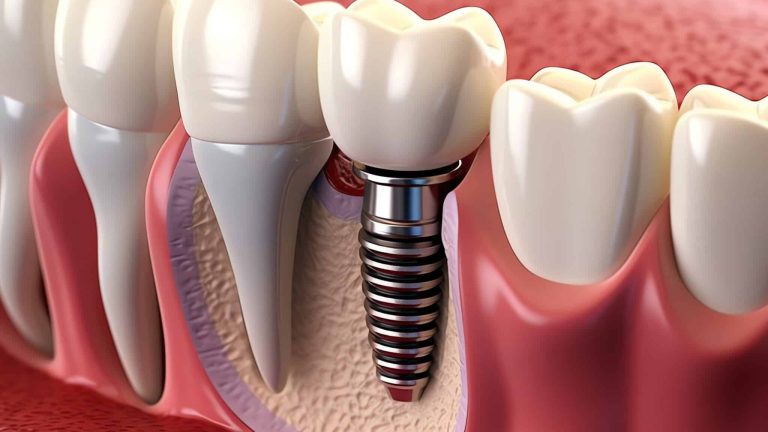Have you ever felt a sharp twinge in your teeth when drinking a cold or hot beverage? This sudden, annoying pain is a typical sign of tooth sensitivity, a problem that affects many people and can make everyday activities like eating and drinking uncomfortable. Tooth sensitivity occurs when the inner layers of the tooth are exposed, allowing external stimuli like extreme temperatures or sweet foods to reach the dental nerves. In this article, we’ll explore what exactly tooth sensitivity is, what causes it, and how to treat it effectively to restore your comfort while enjoying your favorite meals.
Causes of Tooth Sensitivity:
- Gum Recession (receding gums):
Over time, gums may recede, exposing the tooth root, which is covered by a tissue called cementum, thinner and less protective than enamel. This allows external stimuli to reach the nerves. - Enamel Wear:
Enamel is the hardest protective layer of the teeth, but it can wear down due to aggressive brushing, hard-bristled toothbrushes, consumption of acidic foods and drinks, or even teeth grinding (bruxism). When enamel wears away, the underlying dentin, which is connected to the nerves, becomes exposed. - Untreated Cavities:
Cavities create holes in the teeth that, if left untreated, can allow heat, cold, and other stimuli to irritate the dental nerves. - Recent Dental Treatments:
Sometimes, dental procedures such as whitening, fillings, or deep cleanings can cause temporary sensitivity, which should improve over time. - Bruxism (teeth grinding):
The habit of clenching or grinding teeth, especially during sleep, can wear down enamel and expose sensitive areas.
Common Symptoms:
If you experience any of these symptoms, you likely have tooth sensitivity:
- Sharp, brief pain when consuming hot, cold, sweet, or acidic foods or drinks.
- Discomfort when breathing cold air.
- Pain when brushing your teeth or using dental floss.
Available Treatments:
Fortunately, there are various solutions to treat tooth sensitivity and improve your quality of life:
- Toothpaste for Sensitive Teeth:
Using toothpaste specifically designed for tooth sensitivity can be one of the simplest ways to relieve pain. These products contain ingredients such as potassium nitrate, which helps block pain signals between the tooth’s nerves and the surface. - Fluoride Varnish or Dental Sealants:
In the office, your dentist can apply fluoride varnish or dental sealants to exposed areas, creating a protective barrier that reduces sensitivity. - Dental Fillings or Restorations:
If sensitivity is caused by significant enamel loss or a cavity, the dentist may recommend fillings or even crowns to cover exposed areas and protect the nerves. - Laser Treatment:
In more severe cases, laser treatment may be an option to desensitize the nerve and reduce long-term pain. - Avoid Triggering Stimuli:
Adjusting your diet to avoid very acidic, cold, or hot foods and drinks can help reduce sensitivity episodes. Additionally, using a soft-bristled toothbrush and less aggressive brushing techniques can prevent the situation from worsening.
Prevention:
It’s much easier to prevent tooth sensitivity than to treat it once it has developed. Here are some simple yet effective tips to avoid your teeth becoming sensitive:
- Maintain good oral hygiene:
Brush your teeth twice a day with fluoride toothpaste and floss daily. Be sure to use a soft-bristled toothbrush and make gentle circular motions to avoid damaging enamel or gums. - Moderate your intake of acidic foods and sugary drinks:
Sodas, citrus juices, and acidic foods can erode enamel over time. Try to limit their consumption and rinse your mouth with water after consuming them. - Protect your teeth at night if you grind them:
If you suffer from bruxism, consult your dentist about using a night guard to protect your teeth during sleep. - Visit the dentist regularly:
Regular dental checkups are essential to detect and treat dental problems before they worsen. A dental checkup also allows for the identification of early signs of enamel wear or gum issues.
Conclusion:
Tooth sensitivity can affect your daily life, but it doesn’t have to be a permanent problem. With the right treatment and a few changes to your dental care habits, it’s possible to reduce or even eliminate the pain. If you suffer from tooth sensitivity, don’t ignore the problem. Visit us at Clínicas La Guardia for a professional evaluation and discover the most suitable treatment for you!
Call to Action:
Do you feel pain when eating or drinking cold things? Don’t wait any longer to treat your tooth sensitivity. At Clínicas La Guardia, we’re ready to help you regain the pleasure of enjoying your meals without pain. Schedule your appointment today and receive a personalized evaluation from our specialists. Call us at +502 4215 7508 or visit our clinic at Avenida Santander, Plaza Atitlán, Panajachel, Sololá.



